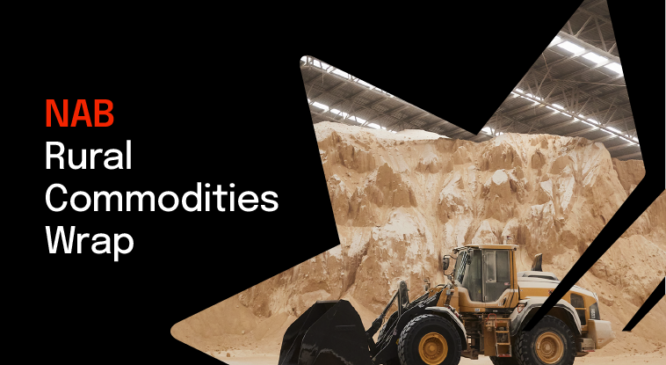We expect NAB’s Non-rural Commodity Price Index to fall by 4.9% in Q2


Insight
In 2015, JT Johnson & Sons, a fourth generation family business selling ruminant animal pellet feed and hay, celebrated its 20th anniversary with Japanese joint venture partner Asahi.
Founded as a small chaff mill, South Australian family company JT Johnson & Sons is now a global business exporting 85 per cent of its product to countries including Japan, Korea, China, Taiwan and Vietnam.
Founded as a small chaff mill in Stockport, South Australia in 1923, JT Johnson & Sons then expanded into pellet production in the 70s before diversifying into hay export in 1987.
Brothers Robbie and Mark Johnson, who have both worked in the family business for decades, were appointed joint managing directors in 2013.
Exports may now account for more than 85 per cent of the company’s business, but this development came about from an unexpected encounter at an agricultural field day three decades ago.
“I still remember Dad telling me the story,” Robbie says. “He was in New South Wales trying to sell pellets when he bumped into some Japanese people who were over trying to find hay for their dairy market. Dad was there selling pellets, not hay, but he went back to the hotel and put his thinking cap on.”
This encounter led to JT Johnson investing in an old double dump press to compress the hay – opening the South Australian business up to the world.
“I remember being a kid and working on the hay plant in the school holidays, it was very small and labour intensive. We’d be lucky to fill half a container in a 10-hour shift,” Robbie says.
The technology has advanced a long way since then. “These days in 10 hours we do about three-to-four containers.”
Japanese joint venture
The next significant step for the globalisation of the business also stemmed from an unexpected encounter.
Robbie’s uncle, Jack Johnson, spent some time studying in Japan and was approached by listed Japanese group Asahi to supply hay. After a year of negotiations, they formed the joint venture Johnson Asahi, which involved Asahi funding a new factory in Horsham.
“It works very well, we’re just great partners,” says Robbie. “The Johnsons run Australia and Asahi run Japan. They look after all the sales and all the dairy farmers over there, and we look after all the growers and suppliers over here.”
In 2015, the group celebrated the 20th anniversary of their successful joint venture.
“We went to a nice restaurant in Horsham and invited all the long-term farmers and suppliers, and Asahi brought dairy farmers along with a few directors from Japan,” Robbie says. “My old man always said, ‘You get your best business down at the front bar on the back of a beer coaster’. It’s probably done in restaurants these days.”
The Asia growth story
Despite its success, the Asahi joint venture only accounts for around half of the hay that JT Johnson exports, with the rest of the export business in hay and pellets remaining with the 100 per cent family-owned business. Asia is the big growth story for the company.
“The demand in Asia is for good quality hay, and that’s been very positive for us. They are very fussy on their food security and Australia’s products are clean and green,” Robbie says.
China is still a small percentage of JT Johnson’s export market, though Robbie expects this to expand significantly in coming years. “It is still very small, but it’s the fastest growing country. We believe that within five years, China will be taking a reasonable amount of hay out of Australia.”
Throughout 2016, the focus for JT Johnson & Sons is for all of the hay presses to be in full production for sale to Asia, and for the completion of a new pellet mill that will double the company’s production capacity.
“Our new pellet mill will be up and running in November this year,” says Robbie. “It’s a 200,000-tonne state-of-the-art pelleting facility that will be the best ruminate mill in Australia.”
He’s confident there are opportunities in the future for a new joint venture partner in Asia.
“It’s a small world. We’re definitely up for it,” he says. “You just never know who you might meet at the agri fair.”
More from NAB:
© National Australia Bank Limited. ABN 12 004 044 937 AFSL and Australian Credit Licence 230686.